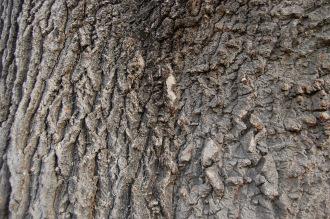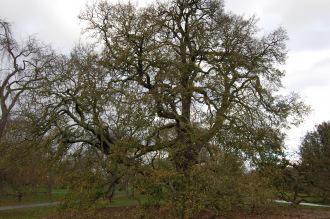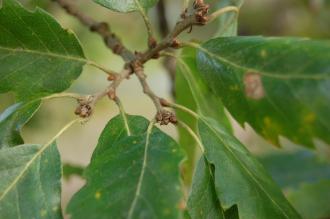
Quercus x hispanica 'Lucombeana' Trunk (21/01/2012, Kew, London)
Position: Full sun
Flowering period: Late spring
Soil: Moist, well drained
Eventual Height: 35m
Eventual Spread: 20m
Hardiness: 7a-10b
Family: Fagaceae
Quercus x hispanica ‘Lucombeana’ is a large, spreading, semi-evergreen tree. Its dark green leaves are up to 12cm long, ovate to oblong in shape, deeply lobed, with a hairy underside. Its trunk may achieve a diameter of 2m. Its bark is corky in appearance and gray brown in color. Its flowers are both male and female. The fruit of the tree is an oblong, ovoid acorn that is about 4cm long and produced in autumn. The plants produced from these acorns vary considerably.

Quercus x hispanica 'Lucombeana' (21/01/2012, Kew, London)
Quercus x hispanica ‘Lucombeana’ is commonly known as the Lucombe Oak. It was originally created in a nursery in Exeter by Mr Lucombe in 1762. It is a cross between Quercus cerris and Quercus suber. The Kew specimen was planted sometime around 1773.
The etymological root of the binomial name Quercus is derived from the Latin name for an Oak tree, but some authorities believe it to be derived from the Celtic quer meaning ‘fine’ and cuez meaning ‘a tree’. Hispanica is derived from the Latin meaning ‘from Spain’ in reference to one of its parents Quercus sube . The name Lucombe is from the name of Mr. Lucombe, the botanist who raised it.

Quercus x hispanica 'Lucombeana' Buds (21/01/2012, Kew, London)
The landscape architect may find Quercus x hispanica ‘Lucombeana’ useful as an attractive, large, semi-evergreen parkland tree.
Ecologically, Q. x hispanica ‘Lucombeana’ may provide shelter for birds and other wildlife.
The Royal Horticultural Society has given Quercus x hispanica ‘Lucombeana’ their prestigious Award of Garden Merit in 1993.
Q. x hispanica ‘Lucombeana’ prefers moist, fertile, well-drained soils. It tolerates most pH of soil, including chalky.
Q. x hispanica ‘Lucombeana’ requires little maintenance.

